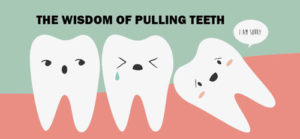
Are your wisdom teeth making their presence known in a painful way? You may feel some discomfort, pressure, or even swelling and all you can think about is why exactly do these pesky third molars need to be extracted?
Well, despite the inconvenience of it all, there’s actually an important reason behind it. Keep reading to find out what that is and how this troublesome procedure can help improve your overall oral health.
What Is Wisdom Tooth?
A wisdom tooth, medically known as the third molar, is an additional tooth that typically grows in the back of the mouth during the late teenage years. This tooth is widely regarded as a remnant from our evolutionary past, when our ancestors’ diets consisted of coarse and rough foods, and a third molar was necessary to grind and chew food.
Nowadays, due to improved dental hygiene and dentistry, the wisdom tooth is often considered unnecessary and can cause various dental problems, including overcrowding or impaction, painful swelling, or infections requiring extraction.
Understanding the importance of this tooth in our oral anatomy can help us make informed decisions about dental care, including when and how to address any issues with our wisdom teeth.
Is Wisdom Tooth Painful?
Wisdom teeth are the third and final set of molars that usually emerge in your late teens or early twenties. Not everyone develops wisdom teeth, but for those who do, the experience can be quite unpleasant.
Wisdom teeth can cause a variety of symptoms, including pain, swelling, redness, and difficulty opening the mouth. While some people may experience a painless eruption of their wisdom teeth, it is important to note that not all wisdom teeth will be asymptomatic.
In fact, many wisdom teeth may become impacted or infected, causing severe pain and discomfort. If you are experiencing any symptoms related to your wisdom teeth, it is important to seek the advice of a dental professional.
Why Do Wisdom Teeth Need to Be Extracted?
Though some people can keep their wisdom teeth without any problems, most dentists recommend their extraction as a preventive measure. This is because wisdom teeth can cause a wide array of oral health issues such as overcrowding, misalignment, gum disease, cavities, and infections.
Additionally, wisdom teeth extraction is essential to avoid future pain, swelling, and discomfort caused by impaction, which occurs when the tooth is stuck beneath the gum line or behind another tooth. Overall, extracting wisdom teeth is a wise preventive measure that protects your oral health and preserves a healthy and beautiful smile.
What Happens in A Wisdom Tooth Extraction?
A wisdom tooth extraction is a common procedure done by a dental professional to remove one or more of the wisdom teeth at the back of the mouth. Typically, these teeth are removed due to overcrowding or impaction, causing discomfort or pain.
The procedure involves administering local anesthesia to the area, making an incision, and carefully extracting the tooth from the socket. While the extraction may cause some discomfort or swelling in the days following the procedure, it is a relatively simple process with a low risk of complications when performed by a trained dental professional.
It is important to follow post-procedure instructions carefully to ensure a speedy and successful recovery.
Tips When Your Wisdom Teeth Start to Grow
As you enter your late teens or early twenties, you may notice a sensation in the back of your mouth signaling the arrival of your wisdom teeth. While some individuals may not experience any issues, others can experience pain and discomfort as the teeth begin to emerge. If you fall into the latter category, there are a few tips that can help alleviate your discomfort.
Firstly, rinse your mouth with warm salt water to reduce swelling and inflammation. Secondly, apply an ice pack to your cheek to alleviate pain. Lastly, take over-the-counter pain medication if necessary.
If your wisdom teeth are causing severe pain, it’s best to visit your dentist to examine the situation further. Remember, it’s vital to keep your wisdom teeth clean and schedule regular check-ups to avoid any serious dental issues.






